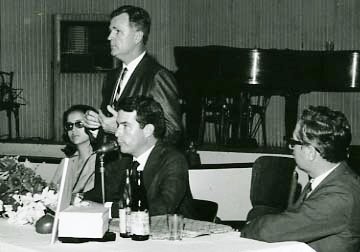Lectures by
Charlie Lutes:
- 28. The Sacred Side of Sex
- 29. Marriage in Life
- 30. Human Emotions
- 31. The Emotional Body
- 32. Values in Life
- 33. Beauty in Life
- 34. You Get Out of Life What You Put Into It
- 35. The Road to Perfection
- 36. Devotion
- 37. Self Mastery
- 38. The Ego
- 39. Birth and Death
- 40. Modes of the Mind
- 41. The Way to Realization
- 42. The Individual and Universal "I"
- 43. The Human as a Light
- 44. God is Love
- 45. Objectives in Life
- 46. Cause and Effect
- 47. Karmic Balance
- 48. A Few Thoughts on Parenting
- 49. Knowledge
- 50. Loyalty in Life
- 51. Thought Forms
- 52. Energy - A Life Force
- 53. What is Liberation?
- 54. The Soul
- Additional Lectures
- Home
Lectures by
Charlie Lutes

The human is many things, but the actual reality of the human is silence. The first stage of silence is the physical. The second stage is the psychological. The third stage is the spiritual. In the first stage the tongue stops talking. In the second stage the mind ceases to imagine. And, in the third stage there is only silence, free from the field of relativity, which shines forth as absolute truth. Now multiplicity has found reality in unity.
The real Self is the life of past, present and future, and in every incarnation it struggles to come out of the maze of matter and all of its entanglements. In every incarnation the Self is involved with a new name and a new form, and at death it is temporarily released from the physical form and name. However, at the next birth, it is again confused by the same thing; a new name and a new form, but in a continuity of the process of evolving.
By the practice of Transcendental Meditation we release our individual self from this repetition and gain an eternal, lasting, absolute status.
Each time we incarnate we identify with the body and with the I" principle. There are, however, two Is, the one that is individual and the other that is universal. In life we are caught up in two important things; imagination and reality or experience. Through imagination we conceive a mental picture of something that generally is far from reality. For example, if for all your life you did everything in the name of God, at the end of your life all you would have would be an imagination of God.
What we need is to experience God, because then you come to know the reality of God. Imagination is a glimmer of the truth in symbols and images. Imagination carries the mind to the gate of reality and when reality appears imagination disappears or ceases. Through Transcendental Meditation the individual I (lower self) begins to be replaced by the universal I (higher Self). By becoming absorbed in love, devotion, charity and service by means of a simple technique one becomes infused with the Self (God) and this becomes freedom and bliss.
The ego has taken the form of the universal I and this has led to very great confusion in life. The ego is not the I because God is the I. What we need is to learn the true I and then the ego vanishes and reveals the pure I as the true Self.
As long as we are in the I am the body consciousness, we are held in bondage and we limit ourselves to the waking, sleeping and dreaming states of consciousness. When we rise above the individual I mode of consciousness, we then automatically gain liberation.
Bondage exists solely in the mind and when we transcend the physical we come into the reality of life and the ego begins to let go. What happens is that the mind changes from the I am the body to I am not the body and it realizes I am an eternal and immortal spirit. We then know that it is God that shines eternally in us as the I. The spirit of the human and the spirit of God is one and the same thing.
When death comes, it is the body that dies and it is the spirit and soul that does not die. So, the Self is the deathless spirit. It is the universal, absolute I. All the conscious activity connected with one's body, senses and mind are centered in the individual I alone.
When one meditates, the power of the meditation focuses the attention on the absolute I and the temporal I vanishes. After continued practice of Transcendental Meditation all thoughts will come and go, but the I thought becomes continuous. Whatever activity the body is engaged in, the individual I will be centered in the cosmic I.
Also, by practice we gain a status whereby we are no longer drawn into worldly desires and entanglements; such desires are burned out and the ego consciousness no longer has the power to draw us into a subsequent incarnation. We become cosmic and we realize that there were never two I's - one individual and one universal. It was the individual karma that made the real absolute, the universal I, operate like the individual I. Now and forever more one experiences the true Self, the true I, one with God. I am that and that I am.
"What we need is to experience God, because then you come to know the reality of God."
© 2005-2011 by Vincent J. Daczynski. All Rights Reserved.